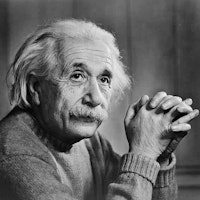I believe that we don’t need to worry about what happens after this life, as long as we do our duty here—to love and to serve.
Albert Einstein

Selfless Service
Topic: Serving Others
I believe that we don’t need to worry about what happens after this life, as long as we do our duty here—to love and to serve.
Albert Einstein, born on 14 March 1879 and passing away on 18 April 1955, stands as one of the most renowned theoretical physicists in history. Best known for his groundbreaking special and general theories of relativity, his scientific endeavors spanned a multitude of areas within the field of physics. Amongst his numerous accolades, he was awarded the Nobel Prize in physics for his elucidation of the photoelectric effect—a phenomenon that expanded the horizons of quantum theory.
Einstein's journey, however, wasn't merely defined by scientific discoveries, but by the myriad challenges he overcame across various dimensions of his life. In his spiritual journey, he grappled with the concepts of God and universe. Socially, he navigated the complexities of his time—facing the rise of anti-Semitism, experiencing exile from his homeland due to Nazi oppression, and advocating for civil rights, disarmament, and global peace. These adversities only strengthened his resolve and underscored his resilience.
Beyond his professional accomplishments, Einstein's life was enriched by a tapestry of relationships and dialogues with luminaries from diverse fields. He engaged in profound conversations on the nature of reality with the likes of the Indian poet Rabindranath Tagore, discussed the principles of non-violence with Mohandas Gandhi, and deliberated on humanitarian issues with Albert Schweitzer. Furthermore, his camaraderie with fellow scientists and physicists provided a fertile ground for intellectual exchanges, fostering an environment of collaboration and innovation during one of the most exciting epochs in scientific history.
Einstein and the Poet
Einstein, Albert, and William Hermanns. Einstein and the Poet: In Search of the Cosmic Man. Branden Press, 1983.

Albert Einstein
Theme: Serving

About This Albert Einstein Quotation [Commentary]
Albert Einstein’s statement, “I believe that we don’t need to worry about what happens after this life, as long as we do our duty here—to love and to serve,” offers a grounded spiritual ethic shaped by action in the present. He shifts the focus away from speculation about the afterlife, directing attention to the responsibility “we do our duty here.” That duty, defined clearly by Einstein, is “to love and to serve.” These are not abstract values but the very measure of how a person fulfills their role in this life.
The word “duty” carries moral clarity. For Albert Einstein, love and service are not peripheral ideals; they are central to what it means to live responsibly. By placing this duty at the center of his reflection, he invites a way of life where personal meaning is found not in belief about what comes next, but in how we meet the needs of others now. To “serve” and to “love” are, for Einstein, inseparable from our shared human purpose. He saw this orientation as consistent with a universe ordered by harmony and intelligibility, where our moral obligations reflect a deeper structure of connection.
Einstein’s words—“we don’t need to worry” and “as long as”—show his trust in a present-centered ethic. He does not deny the mystery of what comes after life, but he places trust in what is within our reach. To meet our duty “to love and to serve” is to live in alignment with what matters. In this, Einstein points to a life shaped by care, where love and service form the ground of meaning, not as future reward, but as present responsibility.
Additional Quotes from Einstein and the Poet
Related Quotes
Copyright © 2017 – 2026 LuminaryQuotes.com About Us